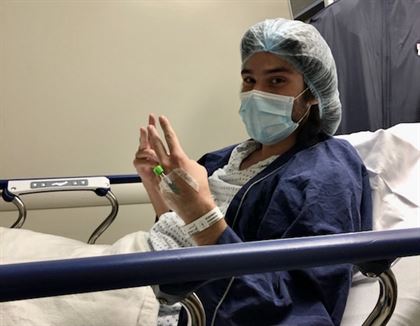During the first week in March, The Montclarion will be publishing content related to the two-year commemoration of the coronavirus (COVID-19) pandemic and the effect it has had on Montclair State University’s campus community #Since2020.
I was 18 when the pandemic started. In fact, it was March 13, 2020, when my high school finally decided to close its doors. If you would have told me by Oct. 23 of that same year I’d be diagnosed with cancer, I wouldn’t have believed it.
But I had to believe it. A year of my life gone, with few strides made forward and now, on top of all of it, I was looking down the barrel of testicular cancer just two months before my 19th birthday.
The doctor didn’t initially say the words, “You have cancer.” It almost left my mom with a false sense of hope until she had to ask him to clarify what he meant by “tumor.” Finally, he uttered, “cancer,” at which point my mother shut down, as all mothers understandably would. From that moment until after my eventual surgery, I had to be the adult in the room at all times.
Testicular cancer is a rare and uncomfortable diagnosis. Despite it being one of the most common types of cancer in men ages 15 to 35 and very treatable, it is a diagnosis that many people are under-educated on. Only 400 men a year die of testicular cancer, which has a survivability rate of over 95%. Those often-avoidable deaths are almost entirely due to inaction and fear that leads men not to get a checkup until it’s too late, which stems directly from toxic masculinity and projected social taboos.
Toxic masculinity is dangerous and can kill. Men are allowed to emote, and the idea that they can’t, or are less of a man for crying and discussing things like anxiety, grief or depression is dangerous and childish.
No one taught me how to screen for testicular cancer, not even health class or sex ed. But when I knew something was wrong with my body, that was the first thing I looked up how to do. If it wasn’t for me finding the strength to then go forward and see a doctor that very next day, I could have been one of those 400 men.
My life for that extenuating period would be a rollercoaster of sadness, grief, anger and confusion. I was already going through unspeakable dissonance with the fact that I had cancer and there were no COVID-19 vaccines yet. There was no safety net, so every person I was in contact with from the point of diagnosis to my bilateral orchiectomy was a safety concern.
Tensions were high. We had caught the cancer early and it had spread bilaterally, but not vertically. If everything remained on schedule, I could get out of the woods without going through chemotherapy and be cancer-free within weeks. Yet of course, because nothing is watertight, the exact news I feared the most came from my inner circle.
My mom thought she had a sinus infection, which was a pretty normal thing for her. However, for good measure, since I was in the house and going to appointments very frequently, she got tested. Within two hours of her test, she received a phone call from the clinic telling her she had contracted COVID-19.
I stood across from her in the hallway upstairs as she hung up the phone, like two cowboys facing off at high noon. I watched tears stream down her face, and I, rather frustratingly, screamed at her. I still feel awful about it because I know it wasn’t her fault and she, more so than anyone else, didn’t ask for this.
When the dust settled, I grabbed my things and prepared to possibly live out of my car for the next two weeks, assuming I didn’t come back positive.
Somehow, I tested negative. So did the rest of my family — dad, sister, probably dog, too, which was a miracle. Fortunately, I grew up with family across the street, so they took me in while my house remained a hot zone.
COVID-19 took so much from so many people. Despite cancer and the incredibly tense moments that followed, my family all came out on the other side alive. I got my surgery, none of the cancer spread and my tumor markers decreased down to undetectable margins post-operation. I became cancer-free.
I am fully aware of how lucky I got, and even more aware of how unlucky others have been. In regard to cancer, I will probably forever live with a sense of sadness and guilt about what occurred.
As for COVID-19, we have been in this mess for two years now. We have made plenty of strides, but most importantly we have vaccines now. If I can leave this piece with any lasting words, it’s to go get vaccinated. It is not about personal choices or “freedom,” it’s about protecting others and being an ally of those whose immune systems have failed them.
It is vital that you do your duty as a decent human being to protect others around you. This virus may not kill you, but your inaction could kill others.



